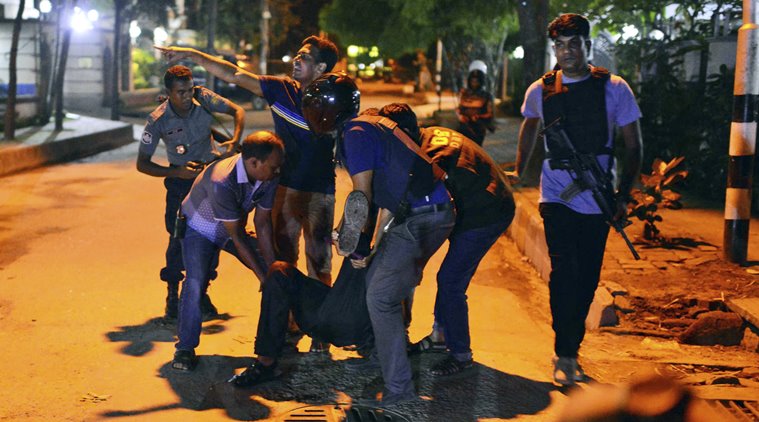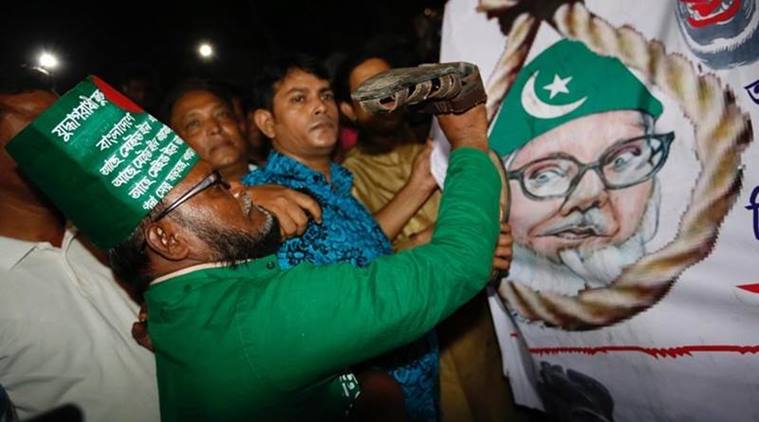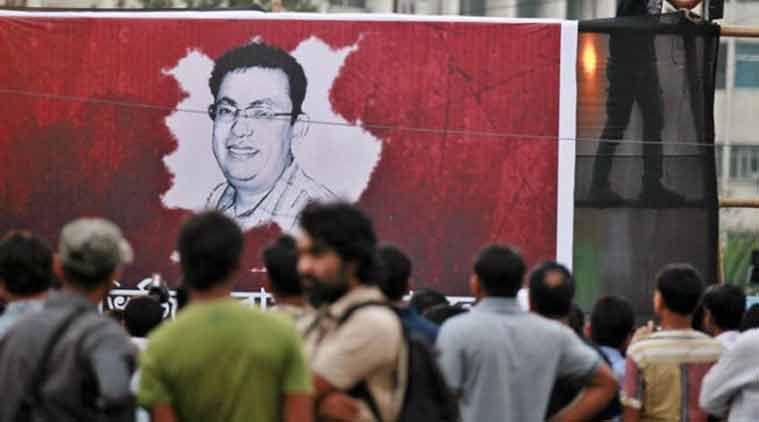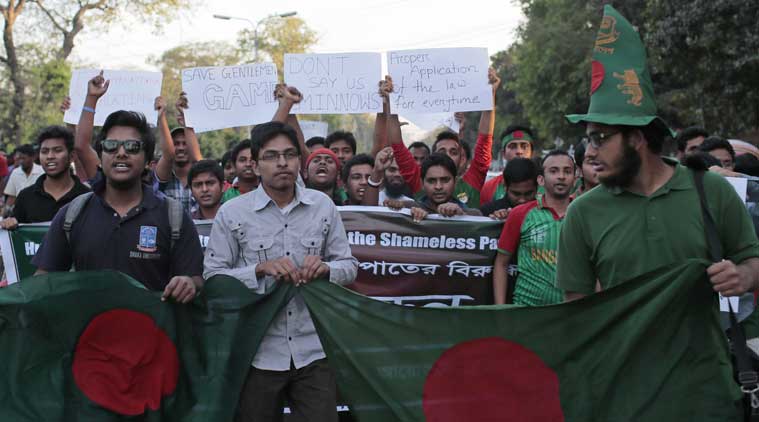Opinion Bangladesh attack: Not a surprise when you see recent history of attacks
The number of attacks on secularist bloggers, teachers and minorities, particularly in the last couple of years, would show that Bangladesh has been a fertile breeding ground for Islamic terrorism and the attack on Friday was perhaps expected.
 Fashion giant Uniqlo has banned non-essential travel to Bangladesh, days after militant Islamists killed seven Japanese nationalists in a bloody siege.
Fashion giant Uniqlo has banned non-essential travel to Bangladesh, days after militant Islamists killed seven Japanese nationalists in a bloody siege.  As per eyewitness accounts, the terrorists stormed into the restaurant, singled out foreigners and anyone who could not recite the Quran and hacked them to death. (AP Photo)
As per eyewitness accounts, the terrorists stormed into the restaurant, singled out foreigners and anyone who could not recite the Quran and hacked them to death. (AP Photo)
Late on Friday evening, a group of five armed men entered Holey Artisan Bakery in Dhaka and opened fire killing at least 20 hostages and two police officers. The nature of the attack has sent shock waves throughout the world, but was it really unexpected in today’s Bangladesh? Maybe not.
As per eyewitness accounts, the terrorists stormed into the restaurant, singled out foreigners and anyone who could not recite the Quran and hacked them to death. The Islamic State has claimed responsibility for the attack, reportedly the worst incident of militant assault in the country’s history.
While this is definitely not the first time a terror attack in the name of Islam has taken place in Bangladesh, the government has long held a strong belief that religious onslaughts were carried out by local groups who were politically motivated, and that there was no trace of ISIS recruitment within the borders of Bangladesh. Even today, despite IS staking claim for the attack, Home Minister Asaduzzaman Khan said the attackers were members of the banned Jamatul Mujahedeen Bangladesh.
Also Read: Dhaka attack: Hostage-takers were from Bangladesh group, not IS, says minister
As per a report by BBC in May 2016, the country’s information minister, Hasanul Haq Inu, said: “To our knowledge, as such today IS has not been involved in the recruitment of militants, or any militant activities within the boundaries of Bangladesh.” He went on to add that “Bangladesh is safer today than Europe or America.”
However, the number of attacks on secularist bloggers, teachers and minorities, particularly in the last couple of years, would show that Bangladesh has been a fertile breeding ground for Islamic terrorism and the attack on Friday was perhaps expected.
 The Jamaat-e-Islami was involved in the murder and assaults of millions in the 1971 Bangladesh Liberation War.
The Jamaat-e-Islami was involved in the murder and assaults of millions in the 1971 Bangladesh Liberation War.
When Bangladesh was created in 1971, the attempt was to find a state based on linguistic and cultural identity as opposed to religion which formed the basis of the creation of Pakistan. However, there remained a few groups in Bangladesh which actively mooted a strong Islamic identity for the nation. Most prominent among them is the radical Islamic group Jamaat-e-Islami, which was involved in the murder and assaults of millions in the 1971 Bangladesh Liberation War. Since 2009, a number of radical Islamic leaders accused of committing atrocities in the 1971 war have been sentenced to death.
The hanging of Islamic leaders came as an encouragement for the formation of local Islamic groups who have been carrying out attacks on individuals, who in their opinion spread “anti-Islamic ideologies.” Since the 2013 Shahbagh protests, the number of militant assaults have been significantly on the rise.
According to Reporters Without Borders, in 2014 a radical Islamic group by the name of “Defenders of Islam” published a list of 84 Bangladeshi secularists, out of which nine have already been killed.
 Avijit Roy, a prominent Bangladeshi-American blogger known for speaking out against religious extremism was hacked to death as he walked through Bangladesh’s capital with his wife. (Source: AP photo)
Avijit Roy, a prominent Bangladeshi-American blogger known for speaking out against religious extremism was hacked to death as he walked through Bangladesh’s capital with his wife. (Source: AP photo)
Majority of those assaulted were bloggers spreading messages of atheism and rationalism. In January 2013, 29-year-old Asif Mohiuddin was hacked to death near his office. Mohiuddin’s blog which propagated strong ideas against religions, was one of the most visited web pages in Bangladesh. The same year saw the brutal murder of two other bloggers, Saniur Rahman and Ahmad Rajib Haider, both of whom were Shahbagh protesters and strongly opposed the Jamaat.
In February 2015, the murder of the prominent atheist blogger Avijit Roy, who founded the blog Mukto-Mona (free mind), led to countrywide protests for justice. About a month later, another critique of Islamisation, Ananta Bijoy Das, was hacked to death. Das’ murder was soon followed by the barbaric attack on secularist Niloy Chatterjee.
 Bangladesh citizens protest killing of blogger Ananta Bijoy Das.
Bangladesh citizens protest killing of blogger Ananta Bijoy Das.
Attacks in the name of Islam were not limited to secularist bloggers or writers alone. A number of minorities and foreigners have also undergone savage assaults. In October 2015, Kunio Hoshi, a Japanese citizen, was shot raising alarms among foreign nationals residing in the country.
In February 2016, Hindu priest Jogeshwar Roy was hacked to death at a temple. A similar incident occurred in May 2016, when an elderly Buddhist monk’s body was found the throat slit inside a temple.
Majority of these attacks had been claimed by local Islamic extremist organisations such as the Ansarullah Bangla Team and the Jumatul Mujahedeen. These local militant groups have stated their affiliation to the Al-Qaeda and the Islamic State. However, the Bangladesh government has up till now been in denial of linkages with these organisations.
The attack on Friday, which follows this long spate of Islamic terrorist activities in the country would point to the fact that the country, which currently hosts the fourth largest Muslim population in the world, has been spawning radical Islam and has over time opened its doors to global terrorist organisations like the Al Qaeda and the Islamic State.





